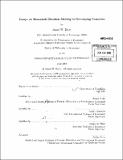Essays on household decision making in developing countries
Author(s)
Berry, James W. (James Wesley)
DownloadFull printable version (20.25Mb)
Other Contributors
Massachusetts Institute of Technology. Dept. of Economics.
Advisor
Esther Duflo, Abhijit Banerjee and Benjamin Olken.
Terms of use
Metadata
Show full item recordAbstract
This dissertation contains three essays on household decision making in the areas of education and health in developing countries. The first chapter explores intra-household decision making in the context of conditional cash transfer programs in education. This study provides an empirical test of whether the recipient of the incentive-either the parent or the child-affects outcomes. I conduct this test through a field experiment in Gurgaon, India where an incentive to achieve a specific reading goal was randomly assigned to be received by either the parent or by the child. I find that incentives to parents result in worse outcomes than incentives to children when parents are less productive in their children's education, measured through lower initial test scores. Conversely, incentives to parents result in better outcomes when parents are more productive, measured through higher initial test scores. In the second chapter, written jointly with Leigh Linden, we estimate the effects of peer networks on the enrollment and attendance patterns of children in a community-based education program in India. The program is open to all out-of-school children, and we randomly assign a subset of the eligible children to be actively encouraged to participate. We find that active encouragement increases participation among selected children by 30 percentage points. Having a treated friend increases participation by about 20% of the main effect. (cont.) The effect of treated friends comes primarily from bilateral ties, where both the child and his friend indicate that they spend time with each other. The third chapter, written jointly with Nava Ashraf and Jesse Shapiro, explores how households make decisions to purchase and use health products in developing countries. This study tests whether higher prices can increase use, either by targeting distribution to high-use households (a screening effect), or by stimulating use psychologically through a sunk-cost effect. We develop a methodology for separating these two effects. We implement the methodology in a field experiment in Zambia using door-to-door marketing of a home water purification solution. We find that higher prices screen out those who use the product less. By contrast, we find no consistent evidence of sunk-cost effects.
Description
Thesis (Ph. D.)--Massachusetts Institute of Technology, Dept. of Economics, 2009. "June 2009." Includes bibliographical references.
Date issued
2009Department
Massachusetts Institute of Technology. Department of EconomicsPublisher
Massachusetts Institute of Technology
Keywords
Economics.